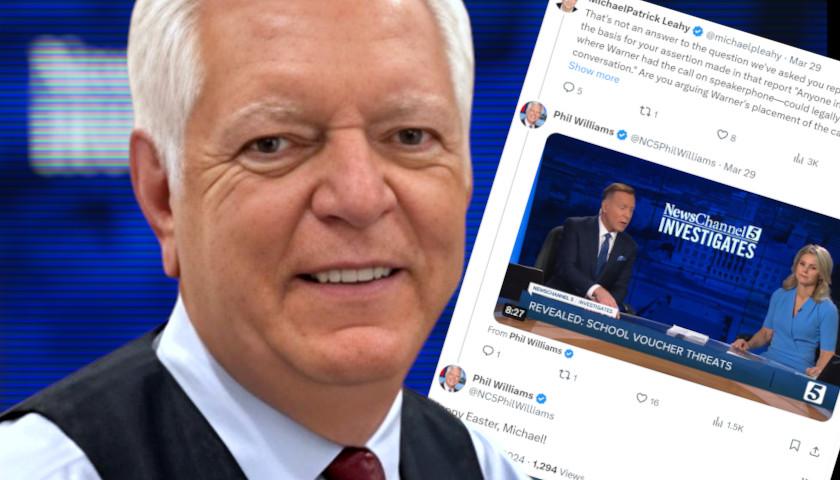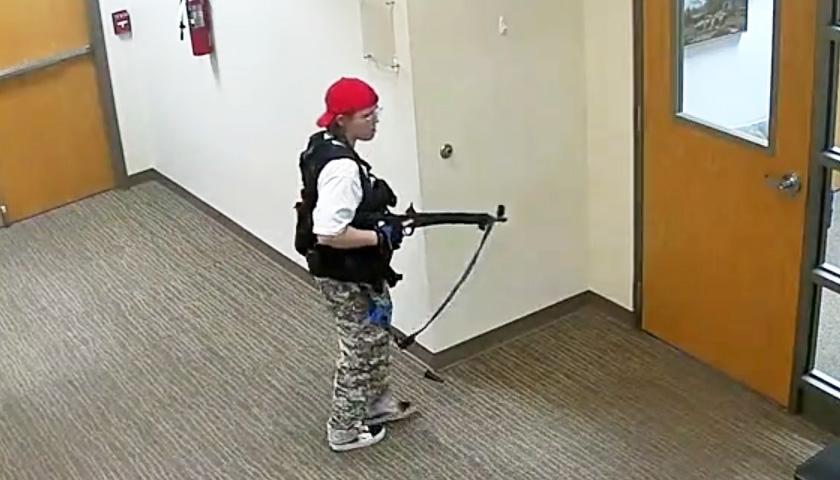Live from Music Row Tuesday morning on The Tennessee Star Report with Michael Patrick Leahy – broadcast on Nashville’s Talk Radio 98.3 and 1510 WLAC weekdays from 5:00 a.m. to 8:00 a.m. – Leahy was joined in the studio by Tennessee State Senator Kerry Roberts.
During the second hour, Senator Roberts addressed the misconceptions of the current bill that would dismiss mandatory state licensing for several professions in the state of Tennessee. He added that he opposed such legislation and was certain that this “caption” bill would be headed for sub-committee and ultimately be unheard.
Leahy: And we are joined as we always on Tuesday mornings by our good friend, all-star panelist, State Senator Kerry Roberts. Good morning Kerry.
Roberts: Good morning. How are you this morning?
Leahy: Great. You know, I keep thinking, there are only 33 state senators (Roberts chuckles) and you are one of them and you are here in our studios and available to all of our listening audience who have questions about what’s going on in the Tennessee General Assembly. And you are plugged in.
Roberts: You know, it’s hard because this is the time of the session where it’s hard to figure out everything that’s going on. It’s like the caller earlier that was upset about this bill that said you could operate without a license.
Leahy: This was Joe from Lebanon and Joe if you’re listening, you can hear it straight from the horse’s mouth.
Roberts: So if you look at a bill like this, it was a 23-page bill. It identified all these professions like attorneys and lawyers.
Leahy: He said attorneys apparently were not in the list.
Roberts: I don’t recall. Anyway, it was 23 pages and you just look at it and you think, the reason that I know this bill exists is that our emails blew up.
Leahy: Oh!
Roberts: Someone on the cosmetology board basically saying you’ve done 2,000 cosmetology training and you’re going to let people cut hair without a license.
Leahy: The bill had about 23 professions.
Roberts: 23 pages and I think it was 25 professions.
Leahy: 25 professions.
Roberts: Give or take.
Leahy: …were in the bill as originally proposed. And by the way, there are a lot of bills proposed every year, right?
Roberts: Yes. And sometimes bills are proposed to make points. Sometimes they are proposed to carry out what we call to carry a “caption” so it’s something you can amend later. Sometimes people are just ill-advised.
Leahy: Just to elaborate on this. There are, in the House. There are a total of 99 members.
Roberts: 99 members with a 15 bill limit.
Leahy: Right. So it’s about 1500 bills that are submitted each year in the House. And in the Senate, there are 33 state senators but there is no limit on the number of bills you can…how many totals can you…
Roberts: But you have to have a companion bill in the House. Both chambers. If you look at Article 2, section 17 of the constitution where it says that a bill can originate in either chamber but it has to have a companion in the other chamber. So by virtue of the fact that the House is limited to 15 each, that’s basically how many bills we are going to have.
Leahy: OK. I got it.
Roberts: Some Senators will have a heavy load. Some will not.
Leahy: OK. So some 1500 bills.
Roberts: And then there are some exceptions to the rules. For example, I have probably had 75 bills that are by virtue of being chairman of the government operations committee just related to things that we are going to renew a sunset cycle on. That’s not going to count against for example against Chairman Daniels 15 bill limit in the House.
Leahy: Chairman Daniels…
Roberts: He’s my counterpart in the House.
Leahy: In the House. Which committee is he on?
Roberts: Government operations.
Leahy: He’s the one that filed the bill. The one that Joe doesn’t like.
Roberts: I don’t like the bill either. So I’m right there with Joe.
Leahy: So the bill listed 25 professions that are currently regulated by the state where you have to get a license.
Roberts: Right. Right.
Leahy: The bill was set forward to eliminate some or all of that licensing for those 25 professions?
Roberts: Let me just tell you. I started reading the bill and said this is never going to work. So I stopped reading. The gist of it is, that if the buyer and the seller of the services agree that this person is not licensed and that’s ok with them then they can use them for the services.
There are some details that surrounded that. That was the idea. So if I disclose to you that I’m a contractor and I don’t have a contractor license and you want to use me anyway then we sign an agreement that basically says that you acknowledge that I don’t have a license and that I can go on and do it. That was the general idea but I may have the details wrong.
So when I looked at that, I thought you can’t do that. For example, I’m a CPA. Well, you can’t sign audit reports and do all this other kind of stuff if you’re not a licensed CPA. So there are some things that legally you cannot do. So I called Janice Bowling.
Leahy: State Senator Janice Bowling who was the Senate sponsor of this bill.
Roberts: And love Janice dearly and it was kind of like, what have you done here? (Leahy laughs) We’re getting blown up on this. She said well, this was a bill that Chairman Daniel had done. And she said it was obvious, I haven’t talked to Martin about it, but he wants to get somebody’s attention. But she said basically, don’t worry about it. I put it in the general subcommittee. That’s the Senate counterpart to the House taking the bill off notice.
So other words it’s not going to be heard. Technically, could it be resurrected or brought out of the general sub. It could be. But she said I don’t have any intention of running this bill so you can tell people that it’s dead. Then I later heard that she said it was really intended to be a caption bill and it just kind of got carried away.
Leahy: Let’s talk about that again. When you say a caption bill, that’s a bill that’s in a general category.
Roberts: It’s a place holder. The way Tennessee, again Article 2, Section 17 in the Constitution, says that a bill can only contain one subject which is why we don’t have these crazy amendments that they do in Washington. Although I maintain that the Improve Act that increased the gas tax, I personally thought it was unconstitutional.
Leahy: I’m not going to disagree with you there.
Roberts: Nobody sued.
Leahy: Nobody sued?
Roberts: There was not a lawsuit. And I will say that it gets Article 2, Section 17 is a little bit subjective because it says it can only contain one subject and that subject has to be expressed in the caption or the title of the bill. So if you look at a bill, it will say this is a bill to amend the title to amend whatever of Tennessee code annotated. OK. That is the key.
So when you file a bill and you say that you want to open up Title 65 you can re-write that bill anyway you want. You can completely replace it as long as it is related that you’re amending Title 65. Adding, subtracting and amending to Title 65. You can’t go outside of Title 65. So all of the litigation in the past has been really about, was it expressed in the caption? Was it a correct caption? I talked to Glenn Reynolds.
Leahy: Ohhh, Instapundit.
Roberts: Great constitutional scholar in Tennessee.
Leahy: Professor of Constitutional Law at the University of Tennessee.
Roberts: Exactly. And he made the point that that idea of the one subject hasn’t been in court. So it gets violated a little bit (Chuckles) inadvertently by differing opinions by what that means.
Leahy: Now did you speak to Professor Glen Reynolds recently about this?
Roberts: No. Back when the improvement act was going on. I picked his brain a little bit. And he wasn’t saying anything for me to repeat on the public record. But let me just say that the guy is brilliant. And he truly is once of our best constitutional scholars in Tennessee.
He is a great resource. There have been a couple of times I’ve gone to him and said, what do you think about this? I wish he was in Nashville instead of Knoxville and I wish he could come and testify opining as to the constitutionality of things.
Leahy: He’s written several books in addition to being one of the leading constitutional scholars in the country. And if you are interested in a sort of libertarian/conservative view of the world, he was one of the first bloggers. You can go to Instapundit.com. We see it all the time. He frequently will link to Tennessee Star stories. No surprise there.
Roberts: Yeah. He was ahead of the power curve. He was very very early in that world of political blogging.
Leahy: So let me just ask you this question. There are 1500 bills up for consideration.
Roberts: Right.
Leahy: I guess some members of the Tennessee General Assembly and state legislators and general members of Congress in general perhaps measure their success by the number of bills passed.
Roberts: Absolutely. And that is a terrible metric. I had a legislator come to me one time and ask me if I had some bills that they could carry. And I said why? Well, I want to look like I’m doing something. I said, look like you’re saying no.
Leahy: See my idea is instead of having more laws, I’d like to see fewer laws.
Roberts: People need to look at a bookcase and see how many pages there are in TCA.
Leahy: TCA being the Tennessee Code Annotated which is the compendium of the current status of the law of the state of Tennessee.
Roberts: Imagine 50 Bibles on a shelf. And that’s about what we’re talking about.
Leahy: Yikes!
Listen to the second hour:
– – –
Tune in weekdays from 5:00 – 8:00 am to the Tennessee Star Report with Michael Patrick Leahy on Talk Radio 98.3 FM WLAC 1510. Listen online at iHeart Radio.








